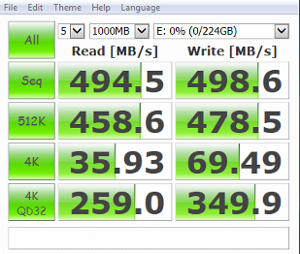CRYSTAL DISK BENCHMARK VER 3.0X64
Crystal Disk Benchmark is used to test read and write performance through sampling of RAW (zero fill / compressible) data, or random data that is mostly incompressible. The left screenshot displays the compressible (zero fill) results, while the right screenshot displays incompressible (random) results.
The Edge Boost Server 7mm attains nearly identical sequential read and write speeds in the zero-fill testing, both coming in just under 500MB/s. The other zero-fill tests show stronger write speeds than read speeds, especially in the 4K and 4K(QD32) tests. In the random results, the Edge Boost Server 7mm did break the 500MB/s threshold, at 504MB/s. Random writes drop off a good bit, but again remain strong in the 4K and 4K(QD32) tests.
AS SSD was until recently the only benchmark created specifically for SSD testing, and it uses incompressible data. For the most part, AS SSD shows us “worst case scenario” SSD transfer speeds because of its use of incompressible data. Enthusiasts often prefer AS SSD for this reason, as they seek to see minimum performance as well as maximum performance. Transfer speeds in MB/s are shown in the left screenshot, and IOPS in the right screenshot. Below these is the AS SSD copybench test, showing speed and duration to complete copying of an ISO image, program files, and game files.
Even with incompressible data, the Edge Boost Server 7mm SSD had “worst case scenario” sequential read speeds of 504MB/s. As with Crystal DiskMark, AS SSD shows strong 4K and 4K(64Thrd) results. Looking at the IOPS screenshot, we see 4K(64Thrd) read speeds of over 65,000 IOPS, and write speeds of over 56,000 IOPS. A total AS SSD score of 778 is a strong result.
The copybench results show superior results for copying an ISO image, but average results for program files and game files.
ANVIL STORAGE UTILITES PROFESSIONAL
Anvil Storage Utilities is an absolutely amazing SSD benchmarking utility. Not only does it have a pre-set SSD benchmark, but also includes such things as endurance testing and threaded I/O read/write/mixed tests; all of which are very simple to understand and utilize for benchmark testing.
In Anvil testing, the Edge Boost Server 7mm came up just shy of 500MB/s reads, clocking in at 497MB/s. Sequential writes came in at just under 479MB/s. Random 4K(QD16) reads attained nearly 67,000 IOPS. Random 4K(QD16) writes hit over 82,000 IOPS. Anvil, like our previous tests, is showing that the Edge Boost Server 7mmSSD is demonstrating very strong random 4K performance, especially random 4K writes. A total Anvil score of 4111 is certainly respectable.
The SSD Review uses benchmark software called PCMark Vantage X64 HDD Suite to create testing scenarios that might be used in the typical user experience. There are eight tests in all, and the tests performed record the speed of data movement in MB/s to which they are given a numerical score after all of the tests are complete. The simulations are as follows:
Windows Defender In Use
- Streaming Data from storage in games such as Alien Wake which allows for massive worlds and riveting non-stop action
- Importing digital photos into Windows Photo Gallery
- Starting the Vista Operating System
- Home Video editing with Movie Maker which can be very time consuming
- Media Center which can handle video recording, time shifting and streaming from Windows media center to an extender such as XBox
- Cataloging a music library
- Starting applications
The Edge Boost Server 7mm SSD showed its best PCMarkVantage X64 HDD Suite performance in test HDD6, Windows Media Center, where it attained over 422MB/s. The PCMark Vantage total score of 64468 is another solid result.
 The SSD Review The Worlds Dedicated SSD Education and Review Resource |
The SSD Review The Worlds Dedicated SSD Education and Review Resource | 


Another day, another sandforce drive 🙂
although its nice to see power loss capacitors on more drives..